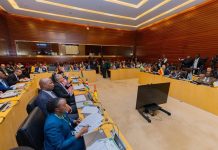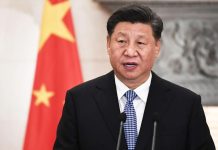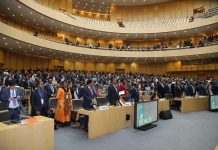Africa-Press – Lesotho. The viability of states constructed on the basis of territorial units established by colonial rule must now be scrutinised. Southern Africans need to look ahead and recommend steps in preparation for establishment of federal state.
In the context of changed world, where the cold war era has long ended and the apartheid system yielded to democratic forms of governance, there is a need to realign the region’s political structures to reflect centuries of history, social coherence and economic activities of the people of Southern Africa.
However, that will be possible if the politicians, policymakers, economists and development planners acknowledge the crude facts of the failures of institutional containers of colonial interests in our region.
Although clear statistics cannot be cited, it is a well known fact that economically there are more informal trading activities taking place across the borders between South Africa (SA) and Lesotho, and between Swaziland and SA, than formally recorded activities.
Be it human trafficking or smuggling of counterfeit cigarettes and other goods between the borders of these countries, these activities on their own serve as survival modes of the communities around these areas.
The use of smuggling in economic contexts; each activity on its own, acts as a compensation against the weakness or incapacity of state institutions to protect citizens or advance people’s interests.
The authorities in their public utterances regrettably acknowledge the unacceptable state of affairs and always promise citizens that the state will intensify the policing measures, so that human trafficking and corruption at “our borders” are curbed.
But regretting is a way of saying citizens should quiescently accept hunger or be content that the past historical injustices have determined their fate, no one can do anything about it.
Well, this chapter is an attempt to do something, along the same lines which other social and economic analysts who offered their thoughts on realignment of the Southern Africa economic and political structures in the post-apartheid era did.
Tito Mboweni, the former SA Reserve Bank governor, (Business Day, 25th September 2014) once commented that; “They are busy trying to make good out of a deep seated crisis,” in reference to Southern Africa Development Community (SADC) leadership peace efforts in Lesotho.
Instead, he argued that a long term solution to the crisis was; “to start work on establishing a ‘federal state’ arrangement involving SA, Lesotho and Swaziland.
The federal arrangements would mean, among others: abolishing border controls and posts between these countries and SA, although Basotho and MaSwati will still carry their own passports to travel outside the borders of the three countries; free movement of capital and labour, instead of the present ridiculous system in which the government systems are far behind the ‘clue’ given the fact that people cross these borders every day without passports.
Instead create a common police border-patrol system for basic anti-crime measures, not people management; create a new revenue/fiscal framework; abolish certain unnecessary ministries and departments in Lesotho and Swaziland and create “federal” ones in Maseru, Pretoria and Mbabane; abolish the defence forces of Lesotho and Swaziland and create a common Swaziland-SA federal force in addition to the SA National Defence Force because Swaziland shares an external border with Mozambique ( Lesotho does not need a defence force) and finally, create “scorpion-type” anticorruption machinery to stamp out corruption and root out predatory and parasitic political class.
”
These changes are possible and it appears the events of the last decade of 21st century which brought an end to a long standing political upheaval that divided western and eastern Europe gave the basis on which Southern Africa can rethink and reinvent its future for the generations to come.
Any analyst who could predict the imminent disappearance of the Soviet Union in 1985, would have been dismissed as crazy. However, now years later, it takes a real effort of imagination to recall that such state ever existed.
Human beings adapt with remarkable speed to changed circumstances. This simply calls for a process of rearrangement of the intellectual furniture: the unthinkable remains unthinkable only until someone thinks it.
It is therefore useful to recognize how quickly the previously inconceivable can metamorphose into a normal and banal. The changes in the international system, which like earthquakes ultimately result from a slow build-up of underlying forces, characteristically occur in sudden and unpredictable shocks.
Over the years Swaziland’s absolute monarchy insulated himself from any public criticism until the king’s government ransacked the country’s coffers to the point that the regime had to come begging to SA for a bailout in 2011.
Pretoria agreed but with conditions attached to ensure that the money given was to benefit the citizens whose government had failed to pay civil servants salaries and provide chronic medicine.
The crisis subsided but the underlying problems that led to it remained. That is despite simmering political discontent, the regime still has power to swindle the country’s resources as it pleases. This has to come to an end at some point.
While in Lesotho a kinship corporation, disguised as a multiparty democracy had not shown any sign of being able to produce a democratic state responsive and sensitive to the general populace’s interests and protects people’s interests.
In Lesotho unlike in Swaziland, the big problem is not about building democracy by counting the number of political parties participating in the national elections but devising and upholding a state which its citizens will accept and respect it as a valid or worthwhile representative of the people’s needs and aspirations.
The politicians are often the ones harvesting the spoils of kinship corporation through the manipulations of the state, with ingenuity of corruption; and the state organs such as the armed forces being used to ensure that this or that group of politicians and their cronies are not hindered from plundering the resources as they wish.
This has been the scenario that had characterised Lesotho up until May 2012 when the country went through general elections that failed to produce a clear winner.
A coalition of convenience was cobbled together but a party with the largest number of seats in the national assembly was left out of the government. However, the coalition fell apart after two years of being in power.
Then a crisis ensued and the prime minister ran to Pretoria when it was evident that after three months of suspending the parliament the military was planning to topple his government.
Throughout its postcolonial history, Lesotho has always been an example of an area in Africa where a state designed within the confines of arbitrary colonial partitioning should not be maintained at all cost. Although the country has fixed boundaries, the effectiveness of state fades out into borderlands where actual levels of state control are uncertain.
It is important therefore to also take into account the fact that the territories inhabited by the people of South Africa, Lesotho, Swaziland and Botswana were divided up between the states only in the mid decades of the twenty-first century.
And these divisions became firmly entrenched in the formal conception of the modern international system in 1969, when the Southern Africa Custom Union (SACU) was established. Prior to that period people did not need passports to travel across these territories.
It has been easily forgotten how recent the establishment of these boundaries has been but the fragile basis on which their actual governance rests continues be a constant reminder that something has to be done about them.
I sometime think regional or perhaps continental political developments may as well usher in a process of evolution that will ultimately change Lesotho’s current political arrangement. That is, if the position advocated by the proponents of regional integration and the unification of Africa is anything go by.
The transformation of Lesotho has throughout history been a process of evolution, not revolution, with much of the changes being determined by the outside factors more than internal interests.
Such changes include the ones observed by Leonard Thompson (1990) in his book The History of South Africa; which shows that since the 1830s when Afrikaner stock farmers began to settle on the high-veld, Basotho had been the Orange Free State suppliers of grain, and during the 1870s the Basotho responded rigorously to new market opportunities in Kimberley, but the tide began to turn in the 1890s.
The arrival of rail and road transport from the ports to Bloemfontein, Kimberley and Johannesburg led to importation of grain from the USA, Argentina and Australia, which could be marketed more cheaply than the grain transported by ox wagon from Basotho farmers.
While that was the case, around the same period, the Orange Free State livestock farmers gradually transformed their farming activities to include grain production.
This process, together with the need for male Basotho to contribute their labour to SA mines, reduced Lesotho’s potential growth in commercial agriculture.
The problem was further compounded by the reduction in arable land and further influx of black share-croppers driven out of the Orange Free State after SA’s enactment of the 1913 Land Act, which confined the people of African origin to only 13 percent of the land.
Agriculture has been Lesotho’s economic backbone but with strained land use and able bodies of Basotho men conscripted to work in SA mines, the country was gradually reduced to a labour reserve economy and that significantly compromised Lesotho’s potential in what was the then booming economic and industrial development brought about by the discovery of minerals in the sub continent.
As Thompson points out (1990: 131) “ by 1900, the colony of Basutoland was set on its tragic course from its nineteenth century role as granary of the Orange Free State to its twentieth century role as impoverished labour reserve for white South Africa.
”
This situation has not changed even after the demise of apartheid. The powers that be in Lesotho have maintained the same economic and political arrangement that existed before 1994. The subordination of Lesotho to SA economic interest was a gradual and systematic transformation process which took decades and a century to perfect.
Despite the fact that prior to 1994 and during the euphoria that followed the fall of apartheid at the National University of Lesotho and within many progressive movements, there was a debate about the future of Lesotho in post-apartheid SA, and such debate did not yield any fruitful engagements.
During these debates several scenarios were proposed, which included a variety of policy options outlining the new future relationship between Lesotho and democratic SA. Most of the policy options were centred around what form of cooperation or economic integration Lesotho would opt for in a post-apartheid SA.
That is, whether the country would opt for a low key sovereignty similar to the one Scotland and Wales have in the United Kingdom or full integration as was the case with West and East Germany after the fall of the Berlin wall in 1989.
These policy proposals were to set a tone for a National Dialogue among the political stakeholders, who would then set a national agenda that would inform the debate between the two countries. Nelson Mandela, during his 1996 state visit to Lesotho, expressed his support for the national dialogue in Lesotho.
This was a right time for Africans in this part of the continent to determine their own destiny, yet for years now after the demise of apartheid such debate did not yield any fruitful engagements.
The International support for such a reconfiguration in Africa is non-existent because the Organisation of African Unity in 1963 guaranteed a continued disunity of Africans by maintaining the same political maps determined by the colonialists.
But many in progressive organisations in Lesotho had hoped it could be put on a bilateral agenda between the two countries. In his address to Basotho nation Mandela expressed the view that Lesotho required the Reconstruction and Development Programme (RDP) to address the effects of decades of economic marginalization by apartheid.
At the time he alluded to Lesotho’s high-level of literacy, a large pool of skilled manpower and a sound current account deficit as positive attributes.
For many members of the ruling elite in Lesotho, this implied “thinking the unthinkable”, but for the majority of Basotho, whose families are divided by these artificial borders, it implied making life easier for them.
However, despite the African diplomatic consensus being firmly opposed to any alterations in the existing boundaries, there are issues of common cause and of a shared common history and cultural heritage, which could not be wished away.
It was not a question of thinking the unthinkable because elsewhere in the world, particularly in Eastern Europe political realignment had to be made following the end of the Cold War Era in the 1990s, with East Germany becoming a unified state with West Germany.
Anne Marie du Preez Bezdrob (2003:14) in Winnie Madikizela Mandela’s autobiography refers to a twin monster that shaped the future of the people of Southern Africa: of colonialism and deprivation.
“The world of the Pondo was prosperous, peaceful and orderly, steeped in the dictates of countless generations. But it was now changing. Colonisation was followed by an invasion by missionaries from Europe, traders and boers (farmers), and the demand for labour and land.
” Bezdrob notes that Xhosas in Pondoland like other kingdoms of Southern Africa were finally subdued and then systemically impoverished as the discovery of diamond and gold towards the end of the nineteenth century and the fledging industries that mushroomed on the Witwatersrand area gave rise to new demands for cheap labour.
Ignoring a need to have political remedies that seek to address these historical injustices by the Lesotho’s ruling elite, when Mandela extended a good gesture was in itself seen as myopic and extremely naive by the then Ntsu Mokhehle’s government.
An analysis of the group that supported inaction when the call was made, leaves much to be desired, “the ruling class”, (bourgeoisie) whose lifestyle differs greatly from those of the toiling masses who have to sell their labour in SA mines and as domestic workers. This group came to constitute itself as bourgeoisie after political independence.
Unlike the classical bourgeoisie of western Europe, who were themselves the owners of property and the upward mobile class associated with commerce during the period of industrial revolution, that elbowed the ruling aristocracies out of the way and came to assert their own political hegemony, the Basotho ruling elite has no comparable achievement to its credit.
Therefore with very little private sector opportunities, once some of them came into power their social status changed and the very thought of losing power drives some of them over the edge, and they become prepared to take arms against their fellow citizens. This attitude goes to the core of instability in Lesotho because the control of the government is key to the elite’s wealth accumulation.
The proletariat under their rule, since they cannot get jobs in the formal sector, where over decades they have toiled under discriminating labour practices in the SA mining industry have to fend for themselves as smugglers, petty thieves of cross border live stock and as prostitutes in the city centres of Bloemfontein and Johannesburg.
Lesotho’s ruling elite’s indifference to Mandela’s call was a betrayal of the people. This was despite the fact that in a modern world no nation has its people losing limbs and lives in service of another nation’s economic interest.
Theirs was also a betrayal of the cause of history, by disowning a course of history that saw Moshoeshoe 1 seeking protection from the British against the Afrikaners encroachment on his territory in 1868 .
On the 12 March 1868, the British parliament declared the Basotho Kingdom a British protectorate. The Orange Free State was forced to discontinue the war if it was not to raise trouble with the British Empire.
Two years after this, Moshoeshoe died in 1870 having saved his kingdom from being overrun by Afrikaners. History records show that there were three distinct wars between Basotho and Orange Free State between 1858 and 1868.
The purpose of these wars was the maintenance of territorial rights in the area between the Caledon and Orange Rivers; from present day Wepener to Zastron, and the area north of the Caledon River, which includes present day Harrismith and the area further westwards.
When apartheid came to an end in Southern Africa in 1994, many of people in Lesotho’s progressive organisations, thought there would be a third way that would lead to the rethinking of new political realignment beyond the social and political confines set by the colonial powers, particularly in the case of a country like Lesotho.
The first road that our region trotted for a century and decades was that of colonialism and apartheid, the second was post-colonial through which slight improvements were made, a third way which has to be piloted for generations to come is the unification of Southern Africa across wider regions, wherein colonial legacy and its enslaving tendencies has to be ended.
Thabo Mbeki’s famous “I am an African” speech resonated well with Southern Africans hopes and aspirations, that the region was beginning to be a wakening giant.
By then it was hoped that the South African economy would expand and prosper as the main engine of economic growth for the vast southern Africa region. At least estimates were that the economy should grow at five percent annually.
However, since Mbeki’s exit from power the direction which the sub-region has been taking remains myopic, with the house of the national assembly in SA degenerating into narrow and petty party political debates; thereby reducing the struggle for freedom to limited objectives.
And often these objectives seem to be limited to the use of state machinery to benefit the ruling party and their cronies. That is as long as the interest of the ruling party and their cronies are served through politics of patronage and nepotism, the objectives of a democratic and free society appears to be narrowly met.
African political scientists like Christopher Clapham (1995:3) have driven a point home that there is a need for the rethinking of African states. The historian Basil Davidson (1990;104) argues about a continent deprived of its history and self-determination.
There is nothing in pre-colonial Africa that the present day Africa could learn about and build on. That is, Africa is divorced from its past. Both Clapham and Davidson draw a paradoxical contrast between Africa and Europe. Europe, according to Clapham was founded on strong states based on nationalism sustained by centuries of history.
By contrast African states are weak, with artificial boundaries that lack internal coherence, mainly because of arbitrary colonial partitioning that did not take into account the cultures, economic activities and the social dynamics that existed in pre-colonial period within these regions.
As a result of this some of these states are dysfunctional even to a point of collapse. When the aftermath of the 1998 general elections in Lesotho led to the devastation and destruction of shops, Lesotho’s largest private sector employment; I was saddened and angered by how initially South Africa handled Lesotho’s political impasse.
However, it was the late Zambian journalist friend and a media trainer in Lesotho, who made me look beyond the crisis with an optimistic view. His view was, “don’t worry it is a nation, it will find its feet and stand up again.
” And looking back to what he said at that time, I realise he was right, any nation can rise from the ashes of doom and gloom.
That is if one considers the fact that countries such as the former Zaire, now the Democratic Republic of Congo (DRC) were able to recover from Mobutu Sese Seko’s years of misrule, Uganda found its feet after years of Idi Amin’s looting and destruction, and Rwanda recovered from genocide, the calamity that befell Lesotho in 1998 was of small proportion in comparison to these countries.
However, are African states like Lesotho and Swaziland resilient enough to survive the kind of challenges that saw European boundaries changed? Or are they living on borrowed time on the edge of an abyss that will soon do to some of them what has already happened to Yugoslavia, Bulgaria and the rest of disintegrated Soviet Union?
A true wisdom points Southern Africa into a direction of rational federalism; a future of organic unities of sensible associations across wide regions within which national cultures, far from competing with each other can evolve their diversities and in them find mutual blessings.
For to continue to cramp and confine the people’s strivings into the nation-state of exclusive and abrasive sovereignties, is to stifle progress and potential development.
New institutional containers of national identities rooted in centuries of co-existence of communities in this region need to be constructed, away from accidental historical divisions that divided many communities from their mother culture.
I am talking about the people of Mpumalanga, Free State and south Gauteng who have historical and cultural links with Lesotho and Swaziland respectively. These proposals at macro-policy level appear to be a workable solution to the problems of governance and new management of the state.
But it is at the micro-policy level where a careful consideration should be made, taking into account the fact that Swaziland and Lesotho are largely rural, relying upon traditional institutions to administer issues such as land use and land allocation.
These traditional institutions and the cultures that produced them have taught these societies how to provide some form of public participation on the day to day running of the community affairs.






